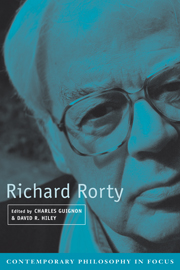Book contents
- Frontmatter
- Contents
- Contributors
- Acknowledgments
- Abbreviations
- Richard Rorty
- 1 Introduction: Richard Rorty and Contemporary Philosophy
- 2 Rorty's Critique of Epistemology
- 3 Rorty on Knowledge and Truth
- 4 From Realism or Antirealism to Science as Solidarity
- 5 Rorty's Democratic Hermeneutics
- 6 Rorty's Inspirational Liberalism
- 7 Don't Be Cruel: Reflections on Rortyan Liberalism
- 8 Rorty and Philosophy
- Bibliography
- Index
1 - Introduction: Richard Rorty and Contemporary Philosophy
Published online by Cambridge University Press: 18 December 2009
- Frontmatter
- Contents
- Contributors
- Acknowledgments
- Abbreviations
- Richard Rorty
- 1 Introduction: Richard Rorty and Contemporary Philosophy
- 2 Rorty's Critique of Epistemology
- 3 Rorty on Knowledge and Truth
- 4 From Realism or Antirealism to Science as Solidarity
- 5 Rorty's Democratic Hermeneutics
- 6 Rorty's Inspirational Liberalism
- 7 Don't Be Cruel: Reflections on Rortyan Liberalism
- 8 Rorty and Philosophy
- Bibliography
- Index
Summary
INTRODUCTION
Richard Rorty has been a lightning rod for conflicting currents in recent philosophy. No American philosopher in the second half of the twentieth century generated such an intense mixture of consternation, enthusiasm, hostility, and confusion. His controversial positions in debates about the nature of mind, language, knowledge, truth, science, ethics, and politics have been regarded by some as opening fresh new possibilities for thought and by others as undermining the very possibility of meaningful inquiry. His more recent praise of American democratic culture and 1930s progressivism is seen by some as a needed antidote to the academic left and by others as politically naïve.
While Rorty is arguably the most controversial American philosopher within the discipline of philosophy itself, he has also been the most influential American philosopher since John Dewey in other areas of inquiry. At a time when the discipline of philosophy has become increasingly professionalized, technical, and remote from the rest of culture, Rorty's work has moved freely in and influenced such areas as literary theory, law, historiography, psychotherapy, education, and social theory. He writes regularly for the popular press, and he is a frequent lecturer and symposium participant in events drawing nonphilosophical audiences on a wide range of culturally important issues. He has reestablished the philosopher as public intellectual and has been no less controversial in that role.
Rorty's influence outside of philosophy is not accidental. It follows from the very reason he is so controversial to traditional philosophers.
- Type
- Chapter
- Information
- Richard Rorty , pp. 1 - 40Publisher: Cambridge University PressPrint publication year: 2003
- 7
- Cited by

